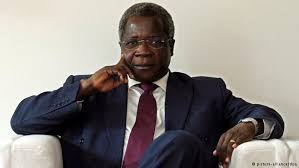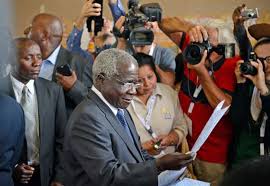 Afonso
Dhlakama, leader of the Mozambique’s main opposition party, the former rebel
movement Renamo, has called for the formation of a caretaker government to run
the country until the next general elections in 2019.In a
lengthy interview in Friday’s issue of the independent weekly “Savana”,
Dhlakama repeated his claim that all elections in Mozambique, including the
ones held on 15 November, have been fraudulent.He
shied away from the term “government of national unity”, and was extremely
vague as to how a caretaker government might be formed. The only thing he would
state with certainty was that he would not be a member of such a government.
Instead he would claim the status of “leader of the opposition”.
Afonso
Dhlakama, leader of the Mozambique’s main opposition party, the former rebel
movement Renamo, has called for the formation of a caretaker government to run
the country until the next general elections in 2019.In a
lengthy interview in Friday’s issue of the independent weekly “Savana”,
Dhlakama repeated his claim that all elections in Mozambique, including the
ones held on 15 November, have been fraudulent.He
shied away from the term “government of national unity”, and was extremely
vague as to how a caretaker government might be formed. The only thing he would
state with certainty was that he would not be a member of such a government.
Instead he would claim the status of “leader of the opposition”.
Dhlakama
declared that everyone in the current government “must go”, with the possible
exception of ambassadors. He said he was willing to draw up a list of people
who could be appointed minister or national directors. The ruling Frelimo Party
would also make proposals, “and we shall negotiate”.
 “Frelimo
has to sit down seriously with Renamo and we’ll design a strategy for how we
survive until 2019”, Dhlakama insisted. “I am willing to help the country”.The
long and rambling interview was peppered with insults. Thus he dismissed the
chairperson of the National Elections Commission (CNE), Abdul Carimo, as “the
moslem”, and claimed that the election campaign of the man who won, Frelimo
candidate Filipe Nyusi, was “a crime” because Nyusi spent a lot of money.Dhlakama
claimed that Carimo had been “obliged” to announce results that showed a
victory for Nyusi and Frelimo. He ignored the awkward fact that the results
announced by the CNE, giving Nyusi 57 per cent of the vote, are broadly in line
with the parallel count organised by the Electoral Observatory, the largest and
most credible group of Mozambican election observers.Dhlakama
also claimed that it was the presence of Renamo members inside the electoral
apparatus at all levels which had allowed the opposition to detect fraud. Yet
before the elections Renamo had claimed that the point of placing opposition
figures at all levels of the executive body, the Electoral Administration
Technical Secretariat (STAE), was not to detect fraud but to prevent it.Dhlakama
claimed this time “it was easy to catch the people who committed fraud”. If
that is the case, why have they not appeared in court?
“Frelimo
has to sit down seriously with Renamo and we’ll design a strategy for how we
survive until 2019”, Dhlakama insisted. “I am willing to help the country”.The
long and rambling interview was peppered with insults. Thus he dismissed the
chairperson of the National Elections Commission (CNE), Abdul Carimo, as “the
moslem”, and claimed that the election campaign of the man who won, Frelimo
candidate Filipe Nyusi, was “a crime” because Nyusi spent a lot of money.Dhlakama
claimed that Carimo had been “obliged” to announce results that showed a
victory for Nyusi and Frelimo. He ignored the awkward fact that the results
announced by the CNE, giving Nyusi 57 per cent of the vote, are broadly in line
with the parallel count organised by the Electoral Observatory, the largest and
most credible group of Mozambican election observers.Dhlakama
also claimed that it was the presence of Renamo members inside the electoral
apparatus at all levels which had allowed the opposition to detect fraud. Yet
before the elections Renamo had claimed that the point of placing opposition
figures at all levels of the executive body, the Electoral Administration
Technical Secretariat (STAE), was not to detect fraud but to prevent it.Dhlakama
claimed this time “it was easy to catch the people who committed fraud”. If
that is the case, why have they not appeared in court?
 For,
at Renamo’s insistence, the electoral legislation was rewritten in February,
and radically changed the appeals procedure. Preciously appeals against alleged
fraud rose up the hierarchy of election commissions – district, provincial and
national. But now any claim of illicit behaviour at a polling station must be
submitted within 48 hours to the district court.Although
it was Renamo which introduced this change, at the elections Renamo did not use
the new appeals route. If the claims of a “mega-fraud” were true, one would
have expected hundreds of appeals to the courts. Instead between them the three
main parties (Renamo, Frelimo and the Mozambique Democratic Movement, MDM) only
submitted 24 appeals in the entire country. Thus most of the courts in the 128
districts were faced with no electoral work at all.According
to the summary presented by the Supreme Court last week, the Renamo appeals
were all rejected either because they contained no evidence, or because they
were submitted beyond the 48 hour deadline. Neither Dhlakama nor the “Savana”
interviewer bothered to mention such awkward details.As for
Filipe Nyusi, “Nobody voted for him”, declared Dhlakama. “Even in his own land
(the northern province of Cabo Delgado) nobody voted for him. Its just half a
dozen Makondes (Nyusi’s ethnic group) in Muidumbe, Nangade and Mueda, who don’t
even amount to 30,000. They stuffed the ballot boxes. It’s all a puppet show.
He knows he didn’t win the elections”.Dhlakama
added he could not accept that all 14 seats in Gaza province would go to
Frelimo “because no competition is permitted there”. But a few lines later in
the interview he boasted of addressing a large rally in the Gaza town of
Chibuto. He thought it was “trickery” for him to address a large crowd, be
applauded, and then win no seats in the province.
For,
at Renamo’s insistence, the electoral legislation was rewritten in February,
and radically changed the appeals procedure. Preciously appeals against alleged
fraud rose up the hierarchy of election commissions – district, provincial and
national. But now any claim of illicit behaviour at a polling station must be
submitted within 48 hours to the district court.Although
it was Renamo which introduced this change, at the elections Renamo did not use
the new appeals route. If the claims of a “mega-fraud” were true, one would
have expected hundreds of appeals to the courts. Instead between them the three
main parties (Renamo, Frelimo and the Mozambique Democratic Movement, MDM) only
submitted 24 appeals in the entire country. Thus most of the courts in the 128
districts were faced with no electoral work at all.According
to the summary presented by the Supreme Court last week, the Renamo appeals
were all rejected either because they contained no evidence, or because they
were submitted beyond the 48 hour deadline. Neither Dhlakama nor the “Savana”
interviewer bothered to mention such awkward details.As for
Filipe Nyusi, “Nobody voted for him”, declared Dhlakama. “Even in his own land
(the northern province of Cabo Delgado) nobody voted for him. Its just half a
dozen Makondes (Nyusi’s ethnic group) in Muidumbe, Nangade and Mueda, who don’t
even amount to 30,000. They stuffed the ballot boxes. It’s all a puppet show.
He knows he didn’t win the elections”.Dhlakama
added he could not accept that all 14 seats in Gaza province would go to
Frelimo “because no competition is permitted there”. But a few lines later in
the interview he boasted of addressing a large rally in the Gaza town of
Chibuto. He thought it was “trickery” for him to address a large crowd, be
applauded, and then win no seats in the province.
 His
solution was simple, albeit entirely illegal. Either split the Gaza seats 50-50
between Frelimo and Renamo or remove Gaza completely from the incoming
parliament. “One of the things I’m going to tell President Guebuza is that I
will wage war with the Constitutional Council (the body that must eventually
validate and proclaim election results) until they accept”, Dhlakama declared.
“The solution is to annul the results from Gaza”.Dhlakama
claimed that “our members” were thrown out of the Gaza districts of
Chicualacuala, Mabalane, Massingir, Massangena, Chibuto and Guija. This is the
first time such a sweeping claim has been made. Between them those districts
had 356 polling stations, and at every one of them Renamo had the right to
appoint a member of staff plus two monitors (one full and one supplementary).In
addition every district elections commission contains two Renamo
representatives, one of whom is the deputy chairperson. Each district branch of
STAE has a Renamo assistant director, two Renamo assistant department heads,
and two other staff members appointed by Renamo. Is Dhlakama claiming that all
these hundreds of people were expelled from the Gaza districts? Or did Renamo
never get round to appointing some of them?
His
solution was simple, albeit entirely illegal. Either split the Gaza seats 50-50
between Frelimo and Renamo or remove Gaza completely from the incoming
parliament. “One of the things I’m going to tell President Guebuza is that I
will wage war with the Constitutional Council (the body that must eventually
validate and proclaim election results) until they accept”, Dhlakama declared.
“The solution is to annul the results from Gaza”.Dhlakama
claimed that “our members” were thrown out of the Gaza districts of
Chicualacuala, Mabalane, Massingir, Massangena, Chibuto and Guija. This is the
first time such a sweeping claim has been made. Between them those districts
had 356 polling stations, and at every one of them Renamo had the right to
appoint a member of staff plus two monitors (one full and one supplementary).In
addition every district elections commission contains two Renamo
representatives, one of whom is the deputy chairperson. Each district branch of
STAE has a Renamo assistant director, two Renamo assistant department heads,
and two other staff members appointed by Renamo. Is Dhlakama claiming that all
these hundreds of people were expelled from the Gaza districts? Or did Renamo
never get round to appointing some of them?
Dhlakama
also claimed that there was a low turnout in the opposition stronghold of
Zambezia because “I believe that STAE received orders to strategically remove
the names of people (from the electoral registers) because most of them vote
for the opposition”.But
Renamo is just as much inside STAE in Zambezia as anywhere else. Did the Renamo
assistant provincial and district STAE directors in Zambezia not notice names
being removed from the electoral registers? Perhaps Dhlakama is suggesting that
all the STAE members his party appointed are incompetent.
0 comentários:
Post a Comment